Mold Remediation & Mold Consulting
Mold remediation is the removal of mold. It can be as simple as cleaning surfaces that are mold impacted or as the photo below shows the removal of walls and organic surfaces that mold grew on.
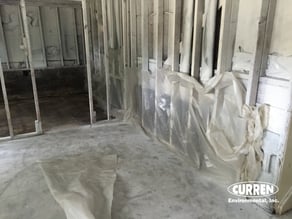
Mold consulting, well that is as it sounds consulting on mold issues. Is the discolored surface actually mold? (We test). We smell musty odors, but do not see any mold, is there mold? We consult on suspect mold issues.
Buying a home? Well home inspectors do not include mold so you need an actual Mold Inspection, we have completed tens of thousands
Mold Inspections
All mold services are performed with in-house equipment and personnel. Our mold remedial technicians are trained and certified. All our inspectors are certified and insured for mold inspections, indoor air quality checks, allergen testing, and remediation. In short, we have a skilled team of mold professionals. That may sound like SOP, but if you google mold companies and look at the street view, so many are one-person outfits working out of their home.). Not saying you can't operate this way, but mold remediation is labor-intensive.
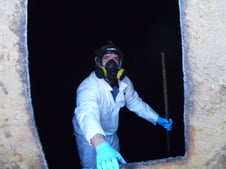
If you find mold growing, there is a moisture problem that has been not fixed. Many real estate transactions find mold growing, which many buyers view as property neglect.
What are the steps involved with remediating (cleaning up) mold?
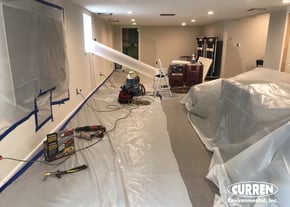
1. Determine if mold is present.
This can be by testing or contracting for a mold inspection.
2. Determine the moisture problem that caused the mold.
If you don't fix the cause of the moisture, mold can and will come back, have seen it happen many times. over 50% of companies miss this step because there is typically more than one issue.
3. Define the area of mold growth, so you know what to remediate.
To be sure if you have mold on the ceiling of an unfinished basement you are going to remediate the entire basement ceiling It is all too common that companies overestimate the area needing remediation.
You don't do something for over 20 years without being good at it. If you call Curren you will be treated professionally. If you have a mold problem, we will confirm it. If you do not, well, we will tell you that as well. Our mold inspections are not free, but our fees are based on what is required and are usual and customary (We count banks and insurance companies as clients and they are cheap). We simply can't do inspections for free to tell people they don't have a mold problem, even though they were told they do have one. We just wouldn't get any actual work done.
Call the Experts 888-301-1050
Available Monday to Friday 7:30 am to 5:00 pm ESTPro Tip 1
Mold Emergency? Not really, mold needs 3 days to start to grow (ever try and grow anything?). Most mold we find has been growing for
months and years, you see mold can grow when moisture is just right and when the moisture goes away growth is dormant. This cycle allows mold to grow undetected for years and will never emit a constant odor (musty - grassy) most often associated with mold as the mold does not have enough moisture to grow 24 hours a day. Beware firms that offer 24-hour service, they know your problem is not new, but your fear is real and they will play off of that.

Pro Tip 2
Did you know? Black mold is not a mold Toxic mold is not a type of mold There are no mold state licensing in New Jersey, Pennsylvania or Delaware. If someone tells you they are certified and licensed for mold, they are not.
Mold growth can be found on any surface providing the right amount of moisture and oxygen. There are molds that are specific to certain building materials including drywall, fiberboard tiles, wood, flooring materials, and cement block. Mold growth can be a concern, particularly where the person exposed is more systemically susceptible or has a suppressed immune system.
Why is mold a concern?
Multiple international health organizations acknowledge that mold is indoor air contamination. Mold when growing (visible) generates spores as one mold spore can range in size from between 3 to 40 microns, and a human hair is 100 to 150 microns. A square inch of visible mold can contain thousands of spores.
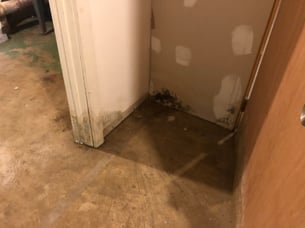
When inhaled mold spores create health issues. Mold also generates mycotoxins as well as MVOCs (Microbial Volatile Organic Compounds) producing chemicals such as benzyl cyanide. Both mycotoxins, as well as MVOCs, produce toxic metabolites that can be toxic to lung cells and may cause upper respiratory tract issues.
Molds can produce allergic reactions or even asthma attacks. Molds can irritate the eyes, nose, throat, and lungs. Even dead mold spores can be an irritant.
What to do when you find mold?
The first step in any mold remediation project is evaluating the source of mold growth. Mold needs organic material and oxygen to grow. Both of these fuel sources cannot be controlled, but the third mold building block is moisture, which can be controlled and when removed or controlled will stop mold from growing.
At Curren, we perform both mold assessments and mold remediation so we get to see projects from start to finish. Years of hands-on work experience gives us a keen eye for finding and fixing problem areas that cause mold problems. If you don't correct the moisture issue, the mold can return. Be wary of firms that want to remediate the mold without identifying the cause.
All Curren project managers perform an initial assessment to determine or confirm that mold is present and why. When needed, such as for mold identification, mold verification, or legal reas
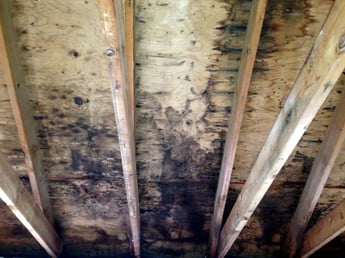
ons, the Curren project manager can test and determine the type of mold that is present and present recommendations on treatment and prevention.
Once the cause(s) are noted, the remediation can be planned. Mold should be treated like asbestos as both remedial approaches follow similar remedial procedures. Curren's technicians are trained in mold remediation and are OSHA certified for the use of PPE (Personnel Protective Equipment), required for mold remediation. We set up a containment area around the area of mold remediation and establish a negative air environment to ensure that the remedial activities contain and capture mold during the remediation.
All mold is captured in HEPA vacuums and encased for disposal. Areas that cannot be remediated such as drywall and cellulose-based materials are removed and the remaining surface area is sealed with an encapsulate.
Honest answers
Professional advice
20 years of professional service
Monday to Friday 8am to 5 pm
888-301-1050
Full-service New Jersey Mold Contractor, and Mold Consultant, with over 20 years of experience. Curren performs mold remediation, mold cleanup, and mold testing. We are a full-service Pennsylvania, Delaware, and New Jersey environmental company. We have been performing mold-related work for over 20 years, making Curren one of the oldest companies in the tri-state area.


